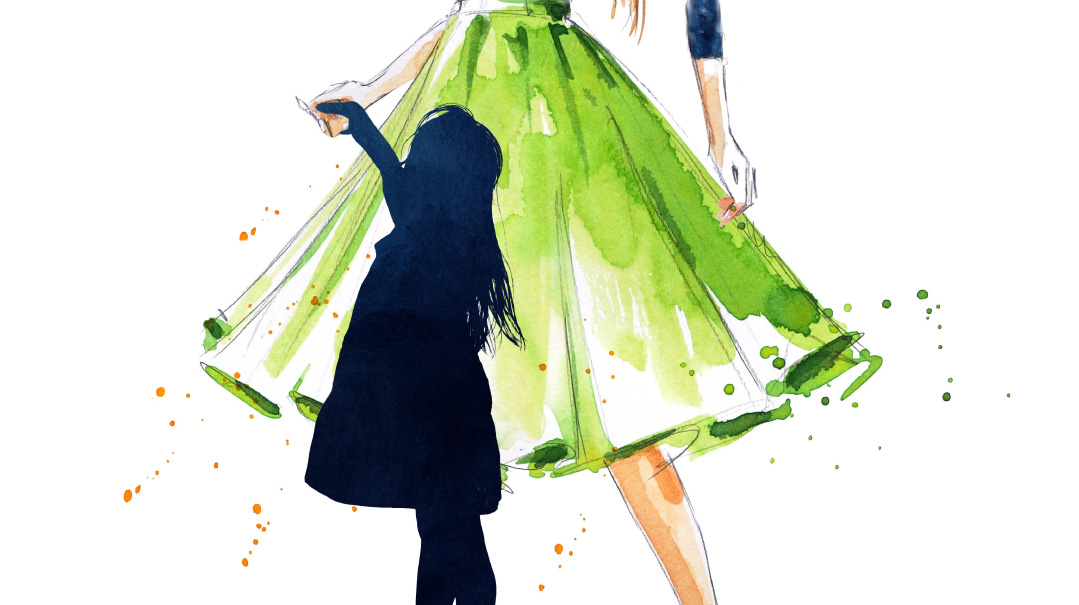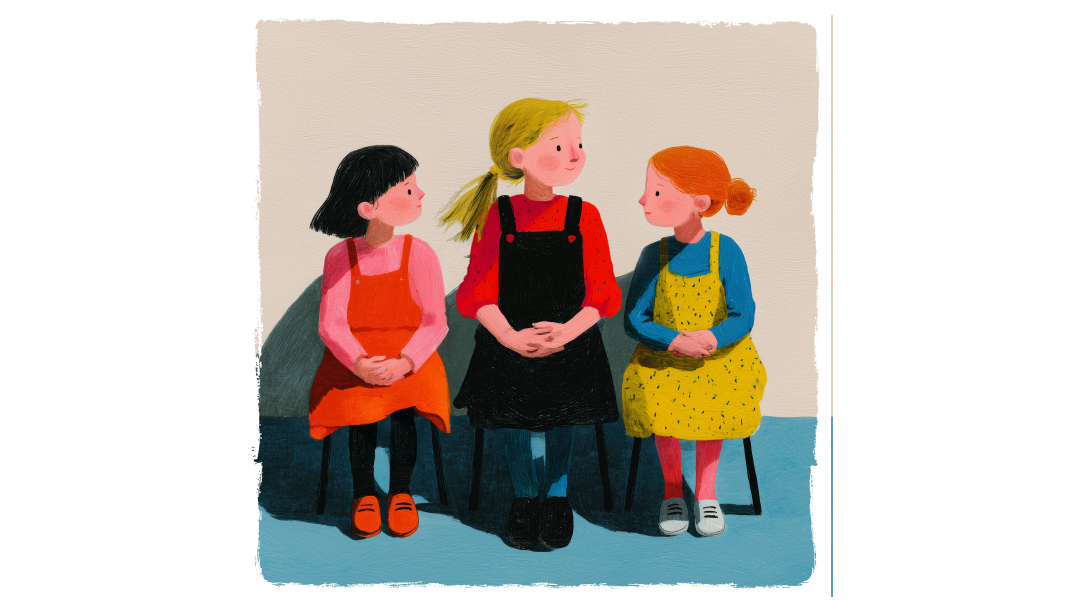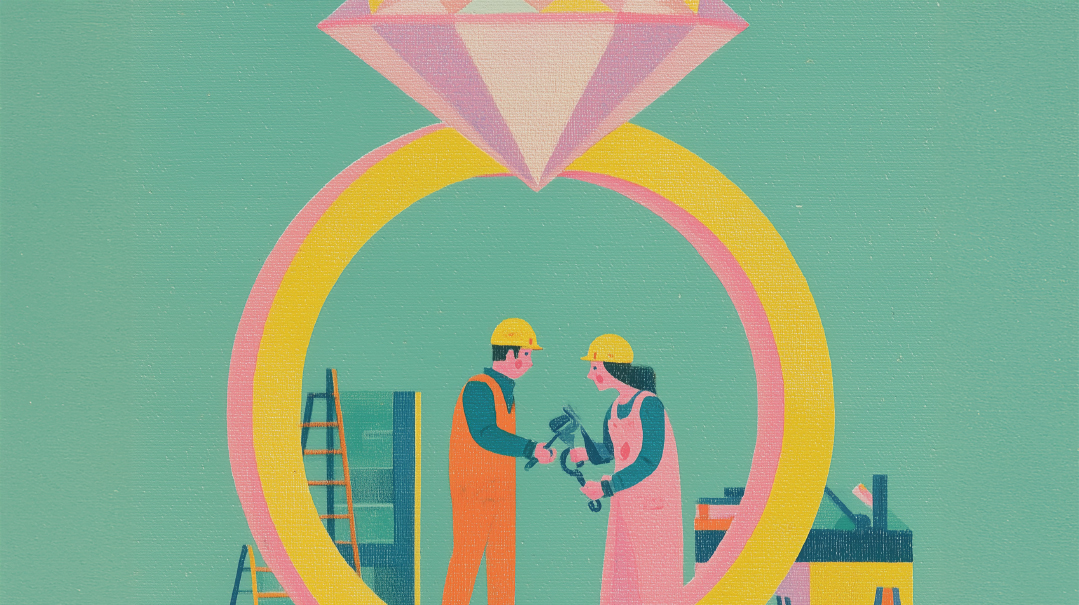Still My Sister
| May 18, 2021What’s it like to build a relationship with a sibling significantly older or younger than you — one you never shared a childhood with at all?

"I don’t say this lightly — the day my little sister was born was one of the happiest days of my life,” Chassi shares. Until she was eight years old, she was the youngest in a tight-knit family. Then a little sister joined the crew.
“There are very few events I can point to and say that I had that level of simchah. I wanted a sibling for so long and finally, here she was. For a long while, I didn’t notice everything else that comes along with having a new sibling, like adjusting to the new family dynamic, getting used to having a baby around, accepting that I wasn’t the youngest anymore.”
Ita was already married with a child when her parents welcomed another one of their own, baby Henny. The two siblings weren’t only 21 years apart and at very different stages of life, they also lived in different parts of the world — at a time when international calls were sparse and expensive.
“We saw glimpses of Henny as she was growing up, but I didn’t actually know her,” Ita says. “There was this concept — I knew I had another little sister — but it wasn’t more than that until she was a teenager and able to travel overseas. In day-to-day life, it didn’t play out as something that was part of my life.”
Still, Ita found it beneficial. Her daughter was the same age as her sister, which meant that she and her mother were attending PTA, planning bas mitzvahs, and sending daughters to seminary at the same time — it gave the two a concrete way to be close.
But while Ita has a sister younger than her daughter, Henny is the aunt who was younger than her niece. “It was — and still is — fun to tell people that I was an aunt from the day I was born,” she says.
Because Henny and her siblings were raised so many years apart, she says it often feels like they come from different families. “My older siblings had young parents who pretty much always had a newborn or were expecting a baby. They lived in a boisterous home with lots of activity. I grew up in a big, quiet, empty house, pretty much feeling like an only child,”she says.
Bailey, Chassi’s younger sister, describes another difference: “I hear the stories of the rules my siblings grew up with… I was definitely raised by different parents.” Whenever Bailey complains about rules like curfew, her siblings are quick to remind her that “when we were your age…” the rules were even stricter.
“My parenting definitely changed,” Raizel, Chassi and Bailey’s mother, says with a laugh. “But it’s because I needed to answer to a bunch of ‘shviggers.’ There were lots of opinions on what she should wear and what she should eat and whether or not she should go for a walk.”
A Road Already Paved
Bailey loves having siblings so much older than her. She doesn’t have to beg her parents for things she as a teen feels are a necessity, like money for extra clothing, because her siblings have already done it before her. Her parents have already been through the stage of teenagers and their meshugassen.
“I think I have it better than my siblings did,” Bailey continues. “It’s easier for my parents to change the rules for me because it’s not like if they say yes, they need to say yes to other siblings as well. It’s just me.”
But there’s another side to this: “It’s lonelier than people realize,” she says. “There are times when the house is just so quiet. My siblings talk about how hectic it was for all of them getting ready in the mornings, and I eat breakfast by myself each morning. There are definitely times when I wish I had a sibling my own age.”
Because Bailey’s siblings came so long before her, no one compares her to them or expects her to live up to their standard. “That pressure people talk about — when you or the people around you compare siblings — is nonexistent for me.
“On the other hand, I don’t have a clear path to follow. They made summer plans and applied to seminaries and all that stuff so long ago that their advice isn’t helpful. My life isn’t relatable for them anymore, and when I want to get advice from them, they’re too far along to share anything helpful.”
Finding the Balance
When Henny was growing up, she felt she had extra mothers who doted on and looked after her. She was touched that they all cared so much about her and never resented the fact that it also meant she had more people telling her what to do.
But her older sister Ita remembers it differently. When their parents were traveling for a simchah, they dropped Henny off at Ita’s home, tasking her with watching her little sister. It was nice to spend time with her, but as the youngest, Henny was used to a lot more freedom than Ita’s own kids had. When Ita would tell Henny to go to bed, the pre-teen was excited to point out with a laugh, that she didn’t need to listen because “you’re not my mother.”
“It became a joke,” Ita says. “Throughout the trip, every time she asked me for something, I’d tell her, ‘But I’m not your mother.’”
It came full circle a few months later when Henny was planning her bas mitzvah. She called her big sister to vent her frustrations. “Mommy isn’t listening to me. She doesn’t understand what I want for my party and isn’t doing things the way that I want. Can you talk to her?”
Ita laughed. “Sorry, honey, I would love to help, but I’m not your mother.” The next time Henny came to stay at Ita’s, she followed every single rule!
It’s a hard balance, Henny says. “You’re the younger kid who isn’t taken seriously and who the older ones think is spoiled. Only once I was an adult did I feel like I had just as strong a standing in the family as the older ones did.”
Family simchahs were always a dilemma — should Henny sit with her adult siblings or with the nieces and nephews, who were her own age? She was the aunt so had a different status to them, but if she sat with her siblings then she’d be with the adults, missing all the fun happening at the kids’ table.
“It was always a big deal,” Ita remembers. “For years, we had the same conversation before every simchah — until our family reached the point where the nieces and nephews grew up, and their table merged with the adults.”
“Sometimes we forgot that even though Bailey was our sister, she wasn’t the same age as us,” Chassi says. “I’d share something with her — because she’s one of the gang, after all — and then I’d think, ‘That’s not something someone her age needs to know.’
“She’s privy to information that I would never have known at her age. But that’s not always fair to her. We also expect her to act the same way we do as adults — but that’s an unrealistic expectation. She’s still a child. She’s not at our stage, and we have to keep that in mind.”
Vast Histories
In a family of adults, Bailey is the one versed in modern trends and modern tech. “Having Bailey around keeps us young,” Chassi laughs. “Aside from the fact that she literally brings down the average age by ten years, she also keeps us in touch with another generation. If not for her, I think we would all act ten years older than we do now.”
Even once the generational gap gets smaller, the siblings still had different childhoods. “The one thing that still makes me sad is that I don’t have the same memories as my siblings,” Bailey says. “I look through the old family albums, and they’re in an alternate universe. To my siblings, these photos are fundamental memories and, to me, it’s just the things they did without me.”
A family can have several different generations of memories, rules, and traditions. Ita says that it’s a nice benefit: You have access to a fuller history. When Ita was a teenager, her grandparents were young enough to still run the family business. She spent hours working alongside them on her Sundays and evenings, getting to see their personalities and business acumen.
When Henny was a teenager, her grandparents had long slowed down and retired. Her memories of them center on visiting their house, taking walks around the blocks, and eating fresh-baked treats.
“We had two different experiences with our grandparents, both of which are very much a part of who they were. When we merge our memories, we have a fuller picture of them than either of us would have on our own,” says Ita.
Mother Knows Best
“Bailey landed in a world of children who were very, very excited about her joining the family, but who were also not used to life revolving around a tiny child,” says Raizel, Bailey, and Chassis’s mother. “It caught the kids off guard, which caught me off guard.”
Raizel remembers trying to walk the tightrope between the baby and the other kids, not making the older ones feel like they were being babied too, but being cognizant of the fact that they still needed attention. If someone would offer Bailey a treat, Raizel would turn to the still-little big sister Chassi and ask, “Do you want a candy too?” She constantly evaluated whether Chassi needed to feel different than Bailey or would want to get the same attention, but the answer wasn’t always so clear.
Dr. Ruchama Fund, a clinical psychologist in private practice in Flatbush, suggests that a way to lesson familial tension between older and younger siblings born far apart in age is to make sure that the older children don’t carry an excessive burden helping out with the younger children.
“On the one hand, helping out can enable children to develop tremendously. Many siblings cherish the role of being older and it gives them a greater capacity for resilience, a feeling of competence, and a heightened sense of empathy.
“There are studies in child development that show that siblings make each other nicer people; it teaches them to care about the feelings of others. On the other hand, that role can quickly become too heavy. Parents need to be put limits on what they expect from the older sibling and for how long — parenting is not the sibling’s responsibility.”
It’s easy to fall into the rhythm of what Dr. Fund calls diminished parenting. “At their older stage, parents are tired. They may have medical issues or be working longer hours. There’s the danger that they won’t parent their younger children with as much attention, and it’s important to make sure that doesn’t happen. The best gift you can give your child is a secure attachment. No matter what, they still need you to be there for them.”
At the same time, she cautions parents to forgive themselves. “Aim to be a good-enough parent. You’ll make mistakes. You’ll be tired and preoccupied. Have compassion on yourself. There’s no need to be perfect.”
Closing the Divide
“Henny was born after I was married. She was busy growing up while I was raising a family, so I had to make a constant and steady effort to be in touch,” Ita remembers.
In those days, there were no WhatsApp or video calls. Emails were slow and tiresome. Ita had to remember to send birthday cards and to call her for milestones like when she finished her school year — which meant working with long distance calls in a different time zone.
Once Henny started traveling more to visit, that dynamic changed for the better. And now that she’s in the same stage as the rest of her siblings — married with kids of her own — it’s like the years of disconnect were erased.
Ita says that there are different stages to the relationship when a sibling is far apart from you in age as well as geographically. “When I was younger, I felt it was more of an issue than it is now. We’re both at the same stage of life now, both raising children. Yes, I’m further along, so I have kids in shidduchim as well as still in school, but there’s still this common thread to keep us together.”
Chassi and Bailey feel the gap closing too. “Now, the eight-year difference is almost half of Bailey’s life. When we’re both in our forties, it will be a much tinier percentage. At the end of the day, I don’t have as much in common with her as I would if I were also a teenager, but that doesn’t mean we can’t connect. I make sure to regularly text her, call her, and keep tabs on what she’s up to in life.
“It’s definitely an effort, but it’s completely worthwhile. First of all, I already see how, with time, you find more commonality. Second, I see it as an investment in our future. Right now we don’t have a lot in common, but b’ezras Hashem one day, as we both move on in life, that will shift for the better. I don’t want our relationship to be so dry at that point that it’s hard to revive.”
Many siblings say that because the siblings aren’t growing up in direct competition with each other, as is often the case when siblings are close together, there’s a certain level of camaraderie they can reach.
“I think it’s good to keep in mind that the sibling relationship is usually the longest-lasting relationship in life,” Dr. Fund points out. “Don’t look at the brief period of time when she’s in preschool and you’re in high school. Look at the big picture — we’re going to be siblings until 120, b’ezras Hashem, and there’s plenty of time for us to find things in common.”
She shares the interesting results of a longevity study conducted over a span of a century. Researchers found that, for women in particular, having close female relationships contributed to a long life. And for many women, the closest female relationship is a sister.
No matter the dynamic, you work on the relationship now and, with Hashem’s help, reap the benefits in the future. “To the extent we can cultivate these relationships,” she ends, “They’re priceless.”
(Originally featured in Family First, Issue 743)
Oops! We could not locate your form.













